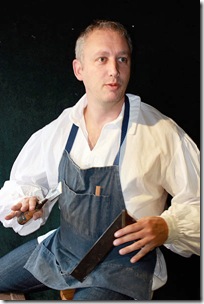Jesus My Boy at Saint Albin’s. The Christ Story Becomes a Family Narrative.
Photo from St Lawrence Shakespeare Company
This monologue, created in 1998 in England by author/actor (John Dowie) and then performed by Tom Conti at the Haymarket theatre the same year, is now appearing in the Ottawa area thanks to Ian Farthing, better known to us as the director of the St. Lawrence Shakespeare Festival in Prescott. Yes Mr. Farthing is an actor, who has worked and trained in the UK, has done musical theatre in Toronto and London. Now Farthing has taken on the fairly demanding role of the carpenter Joseph, the father of Jesus, as he tells the story of the nativity and the life of Christ from the point of view of a working class fellow, who happens to be the father of Jesus, as well as a poor Jew living under Roman occupation. That obviously changes his perspective of things. He has a very tolerant and unmacho vision of the Virgin birth which was surprising; he has a decidedly good knowledge of the Torah, of the squabbles between the different Jewish movements cohabiting in Judea at that period, and a pretty good political intuition about the way colonising Romans knew how to manipulate their own colonized, making it fairly easy to get rid of this trouble maker whom they eventually crucified.
Ian Farthing carried off the monologue with much tenderness. It was a gentle performance of a loving father who had a strong love for his son, no matter what the son did. He changed some of the images that are traditionally associated with the story, i.e. Here, Jesus was born in a cave and not in a stable and he goes into great detail about death by crucifixion which is to be expected by a man who works with his hands and knows how those things were done. But essentially it was the same story, given a working man’s twist.
There was some confusion in as much as the text lumped together various visions of the world without really revealing what the narrator himself believed.
In fact, this monologue belongs to that category of historical event that is being reinterpreted in our era from a modern perspective, as a result of the “Annals” that have given new meaning to the writing of history, even, though this tale was perceived as oral history at the outset. The fact a family member gets involved tells us this is no longer the official discourse of the prophet or the researcher who reads ancient languages and who reconstitutes the biblical stories; no, it becomes an oral retelling a family story, and that changes everything.
Farthing shows us a tender loving husband and a kind father but one gets a sense that Marie appeared to be a bit of a pushy mama who wanted to be obeyed. The actor didn’t go there however because you cannot do that to an icon of the Catholic Church, it wouldn’t be politically correct.
Then, we hear that this father,even though he didn’t appear to understand them, automatically adopted the new theories about human relations, that his own son was teaching in contradiction to the Torah. And, right at the beginning, we hear Joseph say he would prefer not to be a carpenter, but that is “ the cross I have to bear”. Such a Christian image is surprising, coming from a good Jew. One could say that it probably wasn’t that big a step to move from one Monotheism to another especially if your own son is leading the charge and you hate the Romans and then there is all that inner squabbling among the different Jewish factions living in Judea. How is an uneducated carpenter supposed to make his way through all that? He follows his heart and not his intellect, obviously.
In any case, I found the text posed many questions and I spent more time listening to what he was saying, than to how he was saying it which means that his performance did not particularly attract my attention. On the other hand, as I watched Tom Conti’s Youtube video of the same performance (which dates from 2009) , it was the actor who became very interesting. I gather then that Ian Farthing did not bring out all the human variations that were imbedded in that script. Still, the audience loved it. And it is the kind of Christmas narrative that suits the season.
Musician Doreen Taylor-Claxton has a bell like voice and plays the harp beautifully. The setting in Saint Albin’s Church was intimate and fitting. For the so inclined, this is a good evening of theatre produced by the St. Lawrence Shakespeare Festival supported as well by Johnathan Harris and the 9th hour Theatre company.
Jesus My Boy by John Dowie, was performed by Ian Farthing, with music by Doreen Taylor-Claxton
